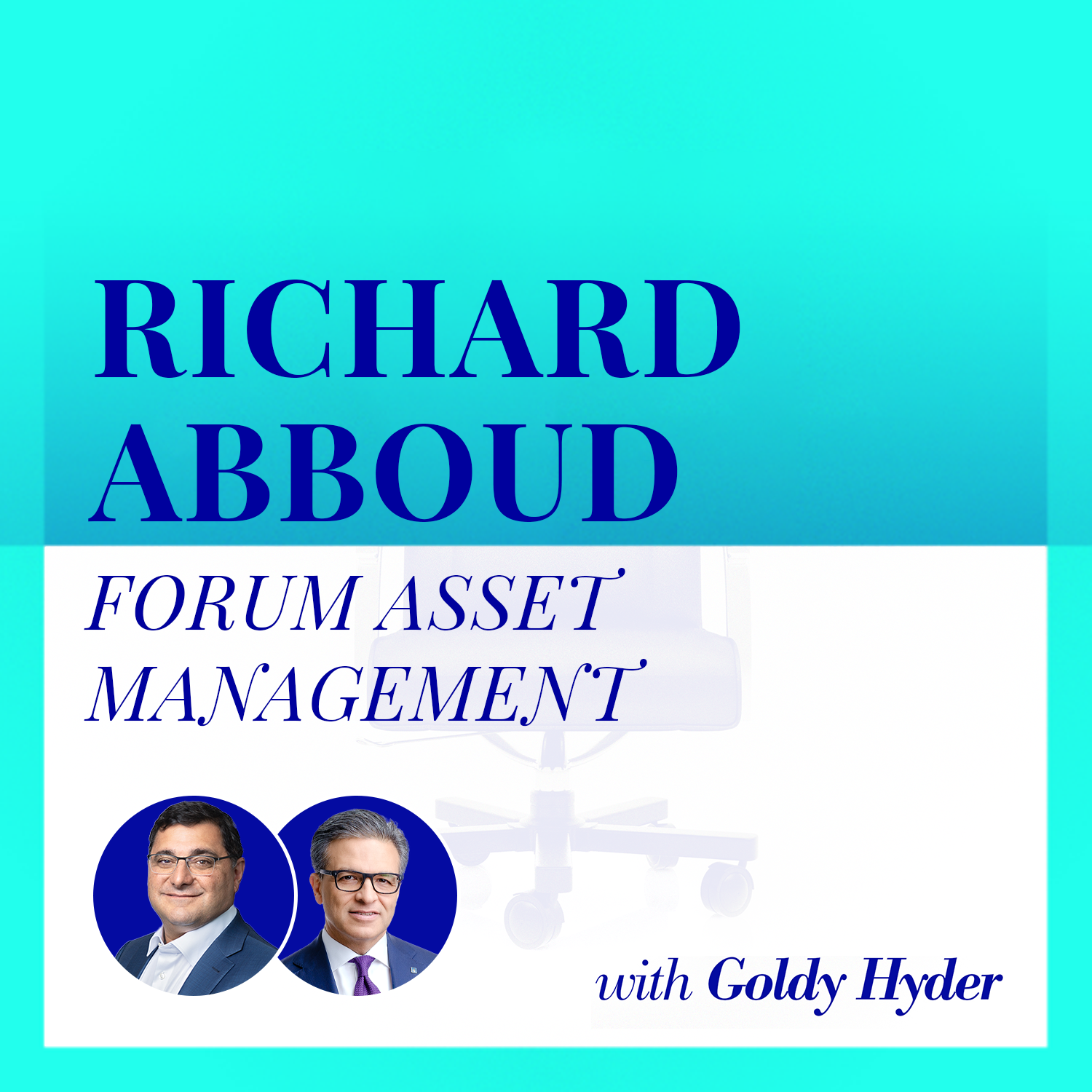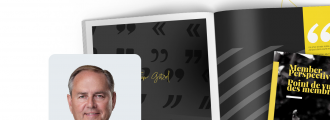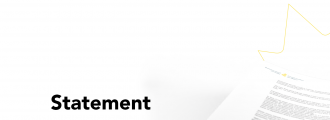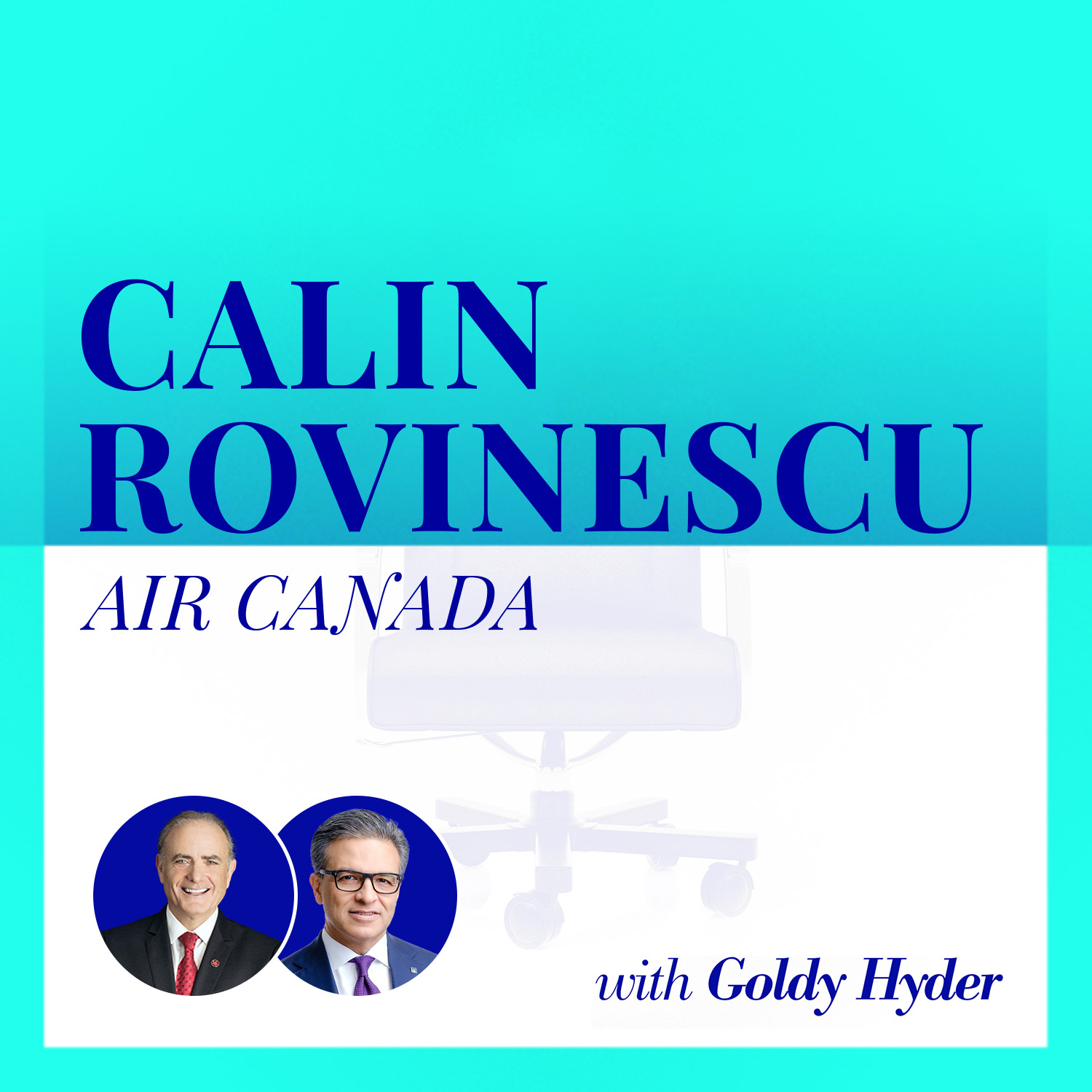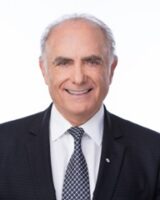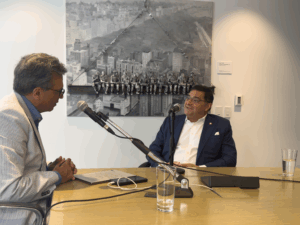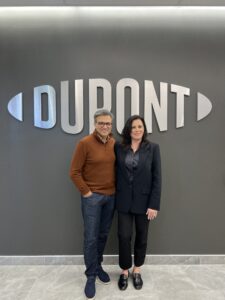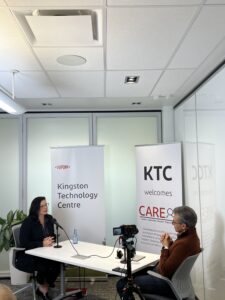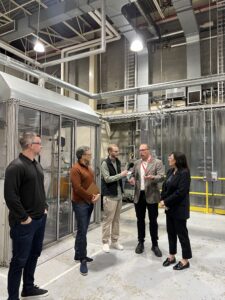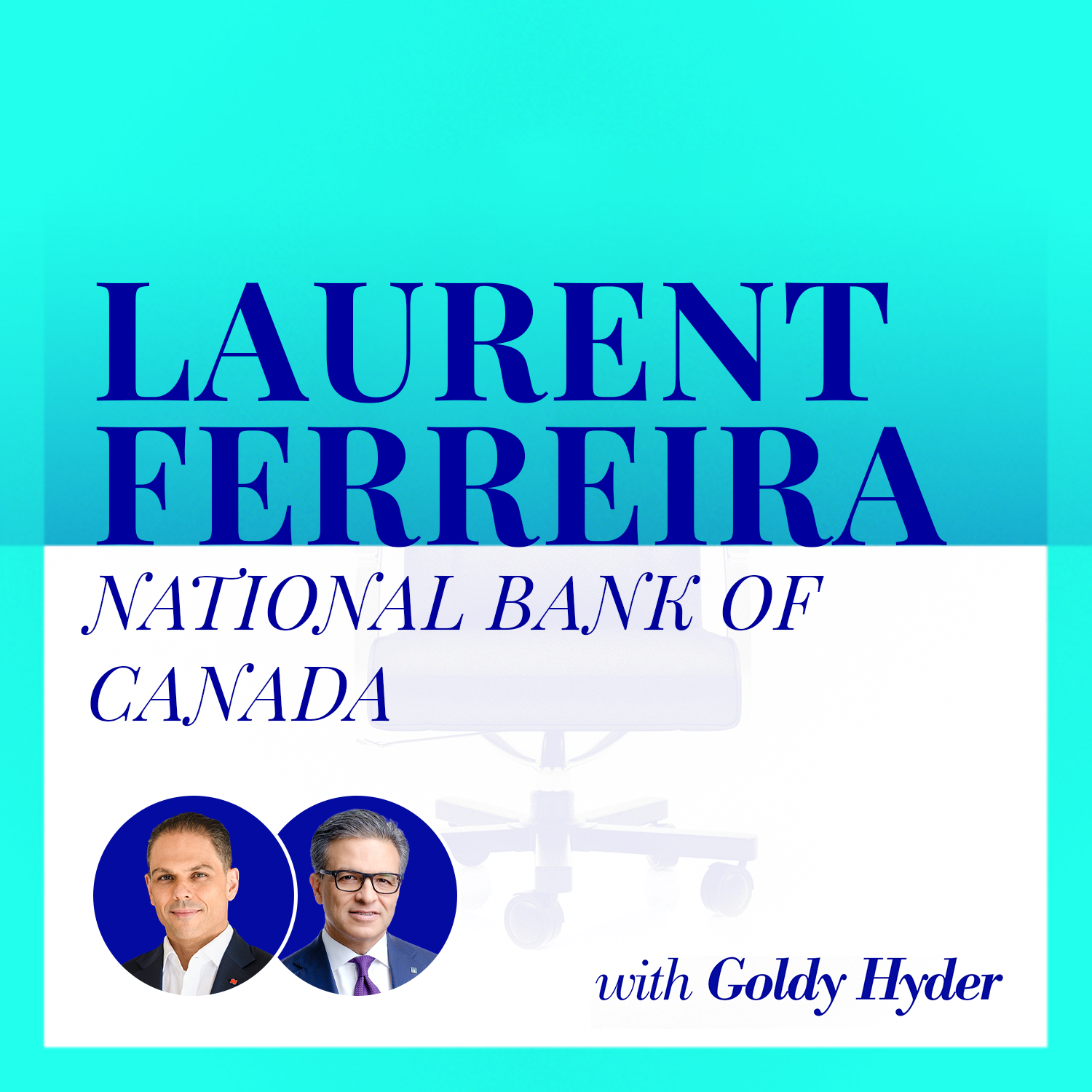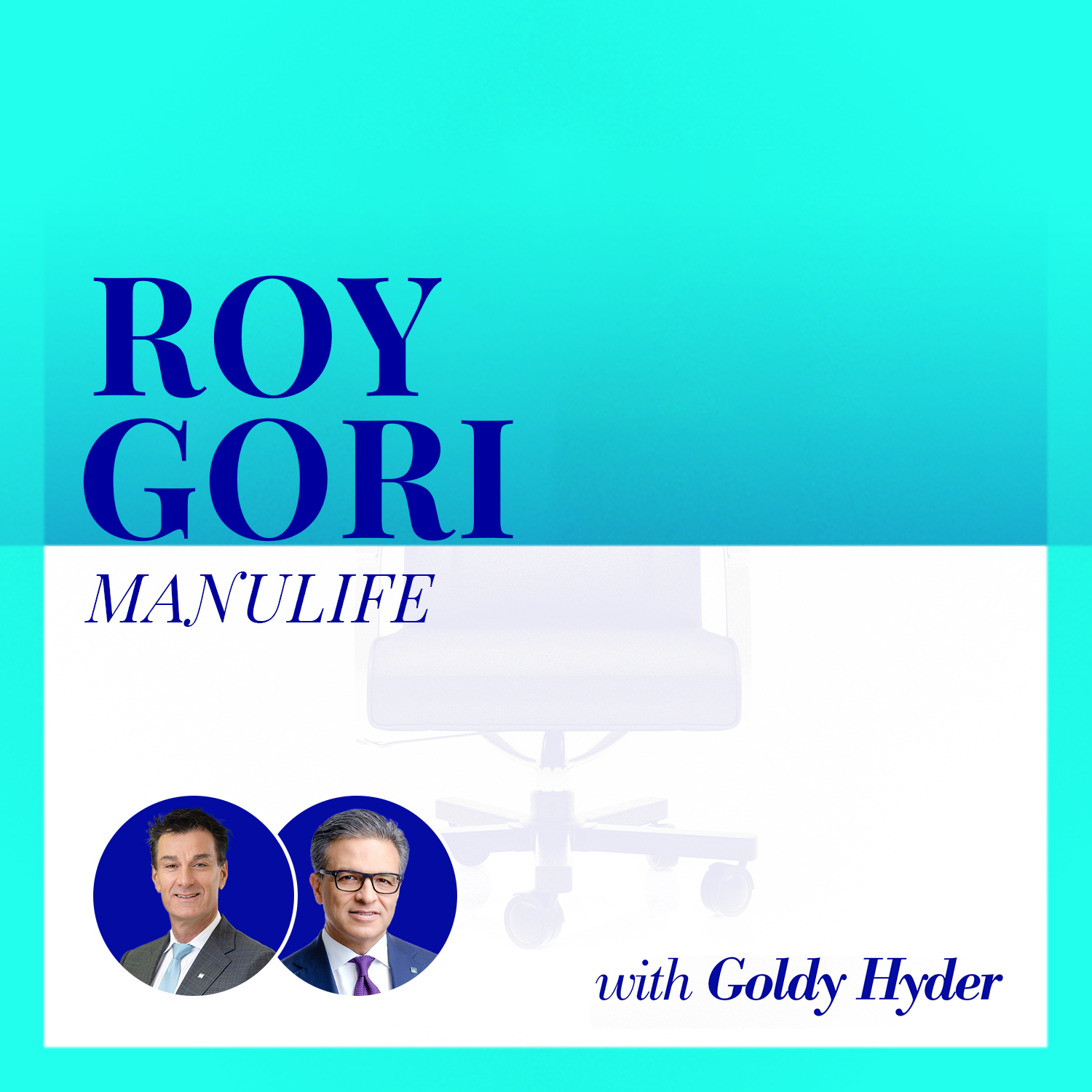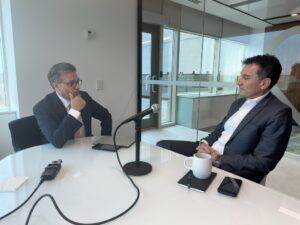Calin Rovinescu is President and CEO of Air Canada.
Calin was just five years old when his parents fled the Communist regime in Romania and settled in Montreal – an experience that profoundly shaped his identity and values. As you’ll hear, his dedication to the success of his company – and the country – is unshakeable.
I spoke with Calin in April, prior to news of the company’s Air Transat takeover bid. But the deal reflects many of the themes of today’s podcast, including Calin’s approach to leadership, calculated risk, and competition.
Goldy Hyder:
Welcome to Speaking of Business Conversations with Canadian Innovators, entrepreneurs and business leaders. I’m Goldy Hyder, president and CEO of the Business Council of Canada. Today’s episode is with Calin Rovinescu, president and CEO of Air Canada. Calin was just five years old when his parents fled the communist regime in Romania and settled in Montreal, an experience that profoundly shaped his identity and values. As you’ll hear, his dedication to the success of his company and the country is unshakable. I spoke with Calin in April prior to the news of the company’s Air Transat takeover bid, but the deal reflects many of the themes of today’s podcast, including Calin’s approach to leadership, calculated risk and competition. Enjoy our conversation.
Calin, thanks so much for doing this.
Calin Rovinescu:
Oh, my pleasure, Goldy. Glad to be here.
Goldy Hyder:
Looking forward to learning more about you and the story of Air Canada. Why don’t we start at the beginning? Last time I was here, we chatted about your parents. They came from Romania. You were five years old. I told you my story of my family coming here from India and I was seven years old. And here you are, CEO of Air Canada. I’m sure we’ll get to that part of it, but let’s start at the beginning. What do you remember about that time moving to Canada? And talk a little about your parents as well.
Calin Rovinescu:
The earliest memory I think I have is when I went to my first days of school in grade one, which was shortly after we arrived. And of course at that stage I didn’t speak a word of English and I was in a school where all the kids spoke English. I remember looking around the room when we were meant to take a nap on our hands, and I remember the teacher saying, “Put your head down.” And I didn’t understand what that meant. I came back that night at home and I asked my parents, “They said something that sounded like, put your head down,” and I couldn’t understand what that meant. And it’s that operating in that gray zone of not fully understanding what’s going on and having to kind of figure it out with your instincts. And as I think back, it actually is quite an interesting zone to operate in. and-
Goldy Hyder:
Almost a sixth sense.
Calin Rovinescu:
Almost a sixth sense. I knew ultimately what it was that I needed to do and sooner or later I figured it out and sooner or later I knew what the expressions were and sooner or later knew how to talk to people, et cetera, et cetera. And I think that that dynamic is something that defines, I think many, many of the immigrant families that come and establish themselves here. And my parents both had significant educations. They were both highly educated people.
Goldy Hyder:
One was a doctor, your dad was a doctor.
Calin Rovinescu:
My dad was a doctor, in fact a surgeon. And for him it was important to continue to be able to not only practice medicine, but to practice his specialty. So he had to go back and finish his residency again, even though he had already done it.
Goldy Hyder:
Some issues have not changed. He’d have to do that still today.
Calin Rovinescu:
He’d have to do that again. Exactly. So he had to get re-qualified as a surgeon. He was not going to be satisfied to just practice general medicine. And so he got re-qualified and that meant working without any income for a period of time to be able to achieve that. And my mother had two degrees and she had several qualifications. She spoke several languages. She had experience with cultural relations with China. But she got a job, just a basic job in retail to support us while my father was going through his training,
Goldy Hyder:
Us being you and your sister?
Calin Rovinescu:
My sister and myself. Correct. And so I’d say that generally it was a very, very modest existence, but one that was truly filled with optimism, which I think has shaped a lot of my vision on life.
Goldy Hyder:
It’s interesting you speak of optimism, but when I think of what your parents or my parents went through, I come up with the word perseverance, that they were just determined to succeed. How much did what they went through affect you in terms of your own journey to becoming who you are? Because you’ve had to persevere through a lot of things yourself.
Calin Rovinescu:
Perseverance, we often talk about the immigrant mindset and there is for sure a mindset. And it existed then and it exists today. It’s a combination of certainly of perseverance, of optimism, of a certain level of insecurity because nobody owes you anything. Nobody owes you a free lunch. You have to go and earn that lunch yourself. No one is going to give you the benefit of the doubt because typically you have funny sounding last names as I do and as you may have as well. And as a result of that, you end up, while you can be optimistic and while you can persevere, you also know that it’s up to you to achieve. And therefore you’re going to be much more focused on all of the lessons you take, both lessons you take from failure, as well as lessons that you take from victories.
Goldy Hyder:
Now you talk about the immigrant mindset. As you look at where we are as a country obviously shaped largely by immigrants, if not almost entirely, with the exception of the indigenous communities, how much of that mindset is driven by hunger? How much of it is driven by coming from a place that clearly isn’t necessarily as good as Canada was or is or will ever be?
Calin Rovinescu:
The necessity has driven a lot of the immigration that we faced. In fact, we talk about immigration, but many of the immigrants, and frankly even my parents were quasi refugees. They basically were leaving the country without any clear vision as to where they were going when they were leaving.
And so it for sure has a component of necessity and survival instincts do kick in. And in some cases you have a little bit of luck along the way. I would not say that everyone’s story is going to be identical to our story or your story. And we were lucky and we were lucky to be right place, right time. Lucky to be exposed to some of the people we’ve met along the way. I’ve been lucky to have had lots of good mentors along the way and people who’ve given me the benefit of the doubt. But generally it’s that necessity has driven a lot of that immigrant mindset. So when you think about some of the things we just talked about, perseverance, optimism, necessity, level of insecurity as to whether or not you’re going to succeed, I think those are all very healthy drivers, quite frankly for business as well as society at large.
Goldy Hyder:
Well, you’ve said a lot there. I’m going to unpack that slowly over the course of this podcast. Why don’t we start with immigration? It’s certainly an area that I wanted to cover with you. A hot public policy issue in many parts of the world. I think it’s fair to say many people think that the opposition to Brexit or the support for Brexit and the support for Donald Trump was driven by anti-trade sentiment, but really it’s being redefined as anti-immigrant sentiment. How do you feel about that issue itself? How do you feel about how Canada’s managing that issue and what should we do as we go forward on the issue of immigration?
Calin Rovinescu:
I’m a big believer not only because of where my family came from, I’m a big believer that a open policy to immigration, when I say open, one that has got-
Goldy Hyder:
Rules.
Calin Rovinescu:
Appropriate rules around it because certainly my parents followed the rules. And my expectation is that there needs to be somewhat of a rules-based. It cannot be a complete free for all. But a open rules-based, driven system will be extremely valuable to the Canadian economy, to the Canadian psyche, dare I say, to the Canadian culture. And by this I mean that we see the baby boom generation coming to an end. Lots of baby boomers retiring. We know there is going to be a massive need for qualified skilled employment coming up. The idea that we can supply that with a low population growth in a low population country is just not feasible and not something that will allow Canada to continue to be a world leader. So when I look at it quite apart from any emotional sentiment I might have around immigration, I also think about the fact that just as a driver of economic development, it’s going to be extremely important for us to continue to openly welcome qualified immigration in the areas that are needed and are relevant for the country within some open rules-based system.
Goldy Hyder:
So when it came time to choose a career track, what are you going to do with your life? What are you going to be? You chose law school. Why did you do that?
Calin Rovinescu:
We had, interestingly enough, my father who as we said, was a doctor, a surgeon, and he was very proud of that and would’ve very much liked to think that I would become a doctor. And so I disappointed him in that dream because while I was okay in science related subjects, it was not certainly not a passion for me.
And my father was quite involved in my decision to go to law school, and he was the one who encouraged me to study in French. It was right around the time of the Parti Québécois coming into Quebec and the dynamic of Quebec becoming more and more, if you want to succeed in Quebec, you needed to be able to speak French fluently. And we always saw law as a great discipline, a great discipline to do many other things from. I practiced law indeed for 20 years basically. And then it also gave me great opportunities to do other things. And so law was not necessarily where I would end up, but law was a great place to get the grounding and the basis to do many, many other things and not to be afraid of something complicated and not to be afraid of hundreds of pages of a document and to be able to have a sufficient understanding of the way things function. So we thought it was a good-
Goldy Hyder:
Good foundation.
Calin Rovinescu:
Good foundation.
Goldy Hyder:
Well, you must be good at it, and certainly were good at it. Right out of law school, you were recruited to one of the top law firms in the country at Stikeman Elliott and Stanley Hart was there, former Prime Minister Mulroney’s chief of staff.
Calin Rovinescu:
Stanley Hart indeed was there and I’d say that I had four senior partners of that generation who were all relevant, who were all key in my evolution. Stanley Hart was certainly one of the four. And we learned a lot of techniques more than simply the law. We learned a lot of techniques from Stanley. He had a very unique personal style, and he was somebody who could shoot from the hip. He was somebody who was quick on his feet, he loved throwing stuff against the wall and seeing what stuck, a great creative mind and encouraged us to think out of the box. And so really a fantastic and relatively unique personality.
Goldy Hyder:
Well, that sets up my next question very nicely, which is I saw a quote from you saying, “They taught me to be nimble on my feet, to be a quick study, to occasionally BS and shoot from the hip when needed.”
Calin Rovinescu:
Yeah, no, this is it. I remember one of the early meetings that he sent me to when I was an articling student, and it was a financing of a film. In those days he was one of the leaders of the emerging Canadian film industry, and he was probably working on four or five deals at the same time. He had a television show, he was involved in labor arbitrations and five or six different things all at the same time.
And so he sent me to one of his meetings that he couldn’t attend. He had not told the people ahead of time that I was coming. And so everyone was expecting the great Stanley Hart to show up at the meeting, and instead they had-
Goldy Hyder:
An understudy.
Calin Rovinescu:
Yeah. A wet behind the ears understudy. And it was on a topic that, as an articling student, I’d not had a lot of visibility around including. It was a public offering. There was a prospectus involved, there were securities commissions involved. There was a completion guarantor for the film involved. And I had trouble understanding what the terms meant, let alone helping these people solve their issues. So yeah, you had to be pretty nimble on your feet and do a little bit-
Goldy Hyder:
So you BSd it?
Calin Rovinescu:
Fancy footwork. At least have some semblance of having a strategy as to how you’re going to answer the questions.
Goldy Hyder:
That’s a great story. Thanks for sharing. Now, Stikeman ironically is where you got involved with Air Canada first. You were very young at the time. How did that come about?
Calin Rovinescu:
Well, again, you talk about great mentors and influence from various people. Another name in addition to Stanley Hart that you would know, Goldy, is David Angus, who was in those days, the chief fundraiser for Brian Mulroney. And was-
Goldy Hyder:
Senator subsequent to that.
Calin Rovinescu:
Senator subsequent to that.
Goldy Hyder:
And was involved in caucus when I was there.
Calin Rovinescu:
Exactly, senator subsequent to that and one of the senior leaders at Stikeman Elliott at the time, and subsequently also on the Air Canada board. And so when Air Canada was searching around for council for the privatization, which was in 1987, so I was 31 years old, David put me forward as a potential candidate to be the lead outside council on the privatization. Now understand that in those days there had not been any significant Canadian privatizations. This was the first in the Mulroney government. This was the first of the major privatizations. It was on the heels of the British privatizations of British Gas, British Petroleum, and British Airways. So we had learned a lot of lessons from the British and from the British privatizations, and I had minor involvement in all of those privatizations. There was always a Canadian component. So witnessed some of that and then David Angus put me forward as a potential lead external council.
And it was one of the great experiences of my life because it enabled me to get really under the covers of everything going on at that time, see the transformation of very significant, highly public Crown Corporation into the private sector with all of the complexity and all of the transformational issues and all of the successes and all of the failures. At the same time we were running a broadly based campaign to offer shares of Air Canada to the public at large, which was complicated under securities laws and so on. So it was a fantastic, eye-opening experience, which dominated good portion of, I’d say a year and a half of my life at the time. And it also put me in contact with Claude Taylor, and there’s some interesting Claude Taylor anecdotes when one looks back. Claude Taylor was the chairman and chief executive officer. He was someone that I worked very, very closely with during the privatization and despite the fact that I was so young, he gave me great access.
And under the Steve Jobs way of looking back at life through connecting the dots, as you may know, that famous Stanford commencement address, I’ve taken the opportunity to look back as well on connecting the dots. And when the privatization was over, Claude Taylor invited me to a private lunch, one-on-one at the Mount Royal Club in Montreal. And it was partly to say thank you to me, but at the same time, he took out a notepad out of his pocket and he started saying, “Now Calin, I want you to tell me from your perspective, given that you’re an outsider to the company, what are the things that you think we haven’t been doing correctly? And what would you do if-
Goldy Hyder:
You were here.
Calin Rovinescu:
You were in my seat.”
Goldy Hyder:
It says a lot about him, doesn’t it?
Calin Rovinescu:
Well, it says a lot about him. And great empowerment
Goldy Hyder:
Also says a lot about you.
Calin Rovinescu:
For a 31-year-old. Yeah, imagine. So that in a way, he may not have known it at the time, but it was if he gave me the secret handshake that related to Air Canada and injected it into my bloodstream, I would say. And then Air Canada continued to be a big part of my subsequent 20 years.
Goldy Hyder:
Well, a dozen years later, you joined Air Canada to oversee its restructuring. Now I gather those were frustrating years. You were there for about 2000 until 2004. What happened?
Calin Rovinescu:
Well, I joined Air Canada on the heels of the Onyx takeover bid. There was a hostile takeover bid made by Onyx together with American Airlines and Canadian Airlines. Air Canada was the larger of the two airlines in Canada at the time, was seen as the one that was winning the competitive battle. And Canadian had tried to do somewhat of a reverse takeover with Onyx and American Airlines. We defeated that. And then following that victory with Robert Milton as the now CEO, I joined with Robert. And Robert and I worked very closely on the defense, the hostile bid, and then I joined and became first one of the senior officers. My position at the time was executive VP of corporate development and strategy, and then we had a vision to create value, lots of different objectives. And then of course we had 9/11 and SARS 9/11 of course was a catastrophic event for the airline industry in North America, globally, but especially in North America.
And Air Canada had the added burden of having had SARS in Toronto, which was one of the two places as you may remember, that suffered from SARS. And that basically decimated the hub. And the third whammy was the pension, very, very large pension deficit. So those three factors led to the restructuring of Air Canada under CCAA, which occurred in 2003, and I became the chief restructuring officer for that process. It was not a frustrating process. It was a very eye-opening process, very, very, very complicated involving all of the creditors of the company, the aircraft lessors, labor unions, governments. It was very complicated.
But we did emerge and we emerged in some respects, stronger. I left in 2004 and co-founded an investment bank, Genuity Capital Markets, which subsequently merged with Canaccord.
Goldy Hyder:
And then you came back.
Calin Rovinescu:
And then I came back, and then I came back as CEO.
Goldy Hyder:
2009?
Calin Rovinescu:
In 2009. And coming back in 2009, we had been hopeful that the restructuring put the company in a good stead. But then of course, in 2008, the company, like many others, suffered from the financial crisis, the global financial crisis. Fuel spiked to $140 a barrel. Air Canada was retreating from international markets. The product was suffering. The pension deficit had climbed again to $4 billion and the company was on its knees and that perfect backdrop I would say. You talk about the proverbial burning platform that was unbelievable burning platform that we had.
Goldy Hyder:
Were you turned on by this challenge?
Calin Rovinescu:
And I was turned on by this challenge, and I joined April 1st, 2009. People thought it was-
Goldy Hyder:
That was no April Fool’s joke.
Calin Rovinescu:
Yeah, people thought it was my version of an April Fool’s joke. But it was a highly stimulating challenge. In the early days, I characterize it as crawling around on our bellies, suturing patients without an anesthetic. That was the way we operated. We had to first save the patient before we could have any aspirations to do anything more grandiose. We had a real deadline because under pension funding rules, we had to figure it out by, I came on April 1st, we had to figure it out by July 31st, and we did. We raised a lot of liquidity in the first months. That stabilized us. We then went to rebuilding our product, rebuilding our brand, buying airplanes, fixing our pension deficit, and cobbling the pieces together to create a fairly stable and sustainable, I’m trying to now use the word sustainable more than just in an environmental context because we have a-
Goldy Hyder:
Longevity, lasting power.
Calin Rovinescu:
Very sustainable, lasting organization.
Goldy Hyder:
Well, let’s unpack that because you said it in a few minutes here, but it took 10 years. Where we are today and 10 year anniversary, I guess we would’ve just passed. So happy anniversary.
Calin Rovinescu:
Thank you.
Goldy Hyder:
How did you turn the business around? You mentioned that you were turned on by it, and I want to explore both, not the minutiae of how you turned it around as much as I want to understand how you as a leader approached the crisis.
Calin Rovinescu:
The way we approached it was very, very simply with four key priorities that we kept on sticking to really from the very, very first days. We used different phraseology, different terminology as we were getting through the crisis, and frankly, we’re still using them today. And we wanted to make sure that the rest of the organization knew what we were doing. So this was as simple words as I could possibly find to explain and to ensure that our then 26,000, today we’re about 31, 32,000 people understand what it is that we’re doing. And lots of great companies have got great visions, great ideas that are just communicated behind closed doors or in a CEO’s office. So we got out actually early on and as we were building the restructuring plan, this sounds like obvious today as we’re doing podcasts and so on, but in those days, no one did a podcast. No one did a YouTube video. So I started doing YouTube videos in April of 2009 right away, telling our company what it was that we were planning to do. We started with that very, very [inaudible 00:20:29]-
Goldy Hyder:
So communications was a key founder.
Calin Rovinescu:
Communications was a key driver. Simplicity of the message was a key driver. Recognition that if we made a mistake and we were going to correct it, we’re going to acknowledge the mistake early on was a key driver. We knew that in our business, lots and lots and lots of companies have disappeared off the face of the map, and the list is very long. Just to remind folks. I like to tell our people about this all the time, lest people think that we’re not fragile as a business, but Pan Am, Airlines, TWA Airlines, Eastern Airlines, Sabina, Swiss Air, because the Swiss of today is not the same as the Swiss Air that disappeared, ANSAT in Canada, Canada, 3000. The list goes on and on.
Goldy Hyder:
Canadian.
Calin Rovinescu:
Canadian Airlines, Royal Aviation, Greyhound, Roots Air. So companies come and companies go, and so how do you keep something sustainable?
And so that message, that resonating message had to be repeated over and over and over and over and over and over. And then our four simple priorities, we had to focus on our cost structure. It’s not good enough to say, “We’re going to pat everyone on the back and say, just because we feel good about ourselves that we’re going to be successful.” We had to deal with our cost structure. We had to deal with the fact that we were diminishing our footprint in international markets. We were not going to win the battle domestically with a lower cost operator domestically. So we needed to expand our international footprint, we needed to improve our product, and we needed to change our culture. So those four things kept on having different phraseology, different expressions up to and including today, our key drivers.
But part of the message here was communication and then empowering both our executive team and our front line, letting people make their own decisions. I said, “Look, I have no desire to invent my own expression, so I’m happy to steal somebody else’s logo.” So I said, “Just do it.” I said, “Let’s not debate it.” I know Nike invented that, so I won’t take credit for it. But in our organization it means something. Do you need to have a paralysis discussion to achieve something that if you came and asked me, I’d tell you, “Well, this is the pros, these are the cons. I might make a mistake, but this is what I think we should do”? Not with respect to obviously safety related issues, but business related issues. Take some risk. Take some risk. And so we put that into our DNA that we become more of a-
Goldy Hyder:
Entrepreneurial.
Calin Rovinescu:
Entrepreneurial mindset. Then we continued morphing some of these messages as we became stronger. And in fact, now I talk about Air Canada as a 80-year-old startup. So why can’t we have in our DNA and in our mindset, some of the characteristics of a startup? Startups are ambitious. Startups have a lot of built-in systems that believe they can take on the world. They operate on audacity. And when I look at some of the valuations that some companies that have been around for 24 months and they expect to have multi-billion dollar valuations as if that’s a normal thing, well, that’s audacity. Well, we could take companies like ours could use some of that audacity. So we started instilling in our mindset in this culture an entrepreneurial mindset, a just do it mindset, having the front line people have a bit more discretion. Again, we’re a rules-based company because we’re A, highly regulated-
Goldy Hyder:
Highly regulated, yeah.
Calin Rovinescu:
And secondly because of safety and other issues like that. So it has to be balanced. It’s just not a total free for all, but something that has served us quite well.
Goldy Hyder:
It sounds like it’s a very values based approach that certainly serves companies and others well, but it wasn’t a straight line. We talk about the 10 years, obviously a lot of success, but there must have been a lot of criticism that came along the way, a lot of doubters, including markets and investors. How did you handle criticism?
Calin Rovinescu:
Well, first of all, I think some criticism is totally merited, and we would take criticism that was, let’s say customer oriented and try to solve it right away. Some of it is easy, low hanging fruit. When I say criticism, it could be something as simple as what is our policy with respect to pets on board? What is our policy with respect to allergies? What is our policy with respect to ancillary fees and name changes? And what happens when someone gets stuck in traffic and misses this flight by a few minutes? What’s the policy with respect to how much time before you check in? So criticisms like that, we actually took on board and developed a customer facing panel that would continue to drive improvements, which helped us improve our product and ultimately enabled us to win best airline in North America seven of the last nine years out of the Canadians who are surveyed in these Ipsos read surveys where 92% of Canadians prefer Air Canada to the competition on business travel.
So this is what enabled us to act quickly where we had criticism that we could act on. Then you have criticism that people are preaching from their own corner of the universe. We had as our shareholder group, we’ve had many short-term investors and hedge fund investors and so on. And as I said, and I said without any issues whatsoever, from my vantage point was, “We’re not running this business for short-term investors. We’re running this business for the long-term. We’re not managing our business from quarter to quarter with a view of having out-sized profits in one quarter and then maybe at the expense of next year or five years from now.” So decisions that we’re making, whether they’re fleet decisions, whether they’re root decisions, whether they’re people decisions are made with respect to the long-term benefit and the long-term sustainable benefit of Air Canada.
Then I’d say, “Well, we also have many differing groups of stakeholders.” And this was one of the things that served me well in having been involved in the privatization because you had so many competing interests. Same thing now. So you have labor unions that have a different perspective, that have to do a job. We have the employee groups themselves will have our lessors and our creditors and our customers and our shareholders. And so balancing these different stakeholder groups, and especially doing so very much in the public eye because Air Canada is so visible, is something that we’ve said that we’re going to zero in on each one of these stakeholder groups. And when I look at the 10-year dynamic, we haven’t satisfied all people all of the time throughout the 10 years, but I’d say that when you look at it after the 10 years, I’d say we’ve satisfied them all over the 10 years.
Goldy Hyder:
And you’re here and you’re growing.
Calin Rovinescu:
And we’re here and we’re growing.
Goldy Hyder:
I’m struck by your acknowledgement and the early adopter that you were of social media like YouTube. It seems to me that CEOs have really had to evolve their communication skills in their own companies to communicate with their employees. How do you view social media? There’s a lot of people who are scared silly, but particularly in the C-suite. But in terms of risks and rewards, how have you been able to use it to your advantage?
Calin Rovinescu:
When we started in 2009, it was just not well known, and I was not comfortable at the beginning. It was something that had been recommended to me by one of my advisors who was in the marketing world, and I was really uncomfortable with it. I said, “What happens if I do this and then somebody takes my image, puts it out of context, puts text across, makes me look foolish, how’s that going to work? Puts words behind my image and says words that are different than what I’ve said.” Who knows? I mean people-
Goldy Hyder:
All of which they could have done with a photograph.
Calin Rovinescu:
Exactly.
Goldy Hyder:
But somehow we didn’t fear that.
Calin Rovinescu:
Exactly. No, precisely. And I had to get over that fundamental-
Goldy Hyder:
Block.
Calin Rovinescu:
Block, discomfort, and I did. And then we did, I think half a dozen of them, and they were interviews that were much like this where I would describe what the next 2, 3, 4, 5 months were going to be, or maybe even one month in some cases. In those days, we were living hand to mouth. And so I’d say getting over that first mental block was important. Secondly, I wanted to create a venue for people to communicate their thoughts. I talk about empowerment. We created something in those early days called creative juices, which was, if you have a creative idea, we needed to have a venue for you to put it in. And in the old days, you’d have a suggestion box that would be beside the water cooler. And of course, we don’t have water coolers or suggestion boxes anymore.
So we created an electronic suggestion box. That’s before we had sophisticated intranet systems where employees can, and now we have that on a-
Goldy Hyder:
Right online on your device.
Calin Rovinescu:
[inaudible 00:28:42]. It goes on all day long. And then the key was getting our people to actually monitor it, because if somebody put in a great suggestion and then no one answered him or her, that wouldn’t be any good. And so it was a combination of getting over the original hurdle, but then also conditioning the organization to say, “Well, this is something that’s worth paying attention to, worth investing in.” And we saw the impact of negative social media through our labor negotiations, much like the US election and much like the interference so-called with democracy. You can have bad behavior using social media to interfere with a union process, with an election of their leaders or ratification of a contract that’s put forward. So the social media dynamic, understanding it and knowing how to manage it has become increasingly important in big business, I would say.
Goldy Hyder:
And you’ve been able to do, I think, from what I’ve seen, a really effective job in your internal communications. You said you have up to 32,000 direct employees, let alone in the supply chain.
Calin Rovinescu:
Correct.
Goldy Hyder:
How have you been with them? How has that evolved in the decade?
Calin Rovinescu:
It’s much more sophisticated than it was when we started. And so now we have a combination of four or five tools. So one is we have a daily communication that is online. We have a company Intranet, which is constantly on the move. We also have a system to reward employees for great service, and we use that as a compensation tool where you get the equivalent of loyalty points for doing great things, which is also done through the social media Intranet type of a driver. And we’re using our own mini webcasts with short messages from some of our key executives. So we’d have a short message on when we’re bringing in a new aircraft or a short message on introducing a new product or short message on a new marketing campaign. So this is combination of video, audio, written text, and it’s gotten to a completely different level now.
Goldy Hyder:
And of course, you’re going to share this podcast with your employees too.
Calin Rovinescu:
We’ll definitely share the podcast. Absolutely.
Goldy Hyder:
Now, you’ve not only been doing internal communications, I want to take you to a speech that you recently gave at the Canadian Club. But before I do, I want to read a quote from a speech that you gave at Concordia University when you received an honorary degree in 2016. And in your acceptance speech, you wrote that courage is the most important driver of human achievement, including and I quote, “Courage to be an unreasonable catalyst for change.” So this speech that you gave in downtown Montreal, it took courage. I read it, and in it you went so far as to endorse the need for pipelines. That’s a really hot button issue in this province. What made you do that?
Calin Rovinescu:
Well, when I talk about courage, it’s not to pat myself on the back or to pat anyone on the back who speaks out. I think that I have a fundamental desire to see businesses lead as opposed to follow policy. We cannot have an environment where businesses are lowest common denominator on the totem pole of things that matter because businesses create virtually all the jobs in the country. Businesses pay virtually all the pensions in the country, businesses pay all the taxes in the country, et cetera, et cetera. And I think that when we identify that, we say, “Okay, well, what are appropriate compromises for the country?”
I’d very much like to see the country stay together as a country. We cannot have this isolation of the West, this dynamic that existed previously between the West and the East. We need to do things that make sense for the country. And I think that what I said in that speech is we have to figure out the pipelines once and for all in the East and in the West. And that means having a right dynamic that recognizes environmental, but that does not completely deep-six the pipeline project.
Goldy Hyder:
And also the Quebec leverage over hydro and other things. So it’s a grand bargain to some extent.
Calin Rovinescu:
No, exactly. And I think that my desire, and this is not any kind of grandiose ambitions other than to say that from the well-being of the country, the country has to be sufficient from coast to coast. And I think that-
Goldy Hyder:
And create wealth.
Calin Rovinescu:
And create wealth and create prosperity from coast to coast. And so I’ve seen how we can shoot ourselves in the foot by being divisive. And I didn’t think it took very much courage to say the statement I said about pipelines, because I think that’s the right answer. And it’s much easier when you feel that you’re on the right side of the issue. And the quote that you scribed to me on courage from Concordia, when I left Air Canada in 2004, one of my colleagues, senior executive wrote me a beautiful note and he said in it reminded me about this comment on courage, I think it was Shaw who said that, “All change has been as a result of the unreasonable man. Reasonable people don’t actually create evolution and change.” And I think that it was a great way of saying, “If you want to continue to evolve, you have to be somewhat”-
Goldy Hyder:
Uncomfortable.
Calin Rovinescu:
Operate in the zone of uncomfortable. Yeah.
Goldy Hyder:
Well, let’s pivot away to some other issues I wanted to explore with you. We’ve talked about your pride of being a Canadian, the opportunities that Canada’s given you, Air Canada, of course a very global brand, a very strong global brand. What are you seeing, what are you hearing about Canada in 2019? And what should we be looking out for in terms of how do we continue to strengthen this country?
Calin Rovinescu:
Well, again, we are one of the most visible Canadian brands internationally. There’s no question about that. And as I like to say, if somebody was to say ask you in China or in Argentina or in Germany or in the United Kingdom to name five or 10 Canadian brands, chances are Air Canada would be on most people’s lists. And so we do get a good perspective on what else goes on in the world. Second thing that I’ll say is that my job and my position gives me access to what goes on in many other countries. On the board of Governors of IATA, which is the International Air Transport Association, I was the chairman of IATA for a period of time. We have star Alliance who’s got 27 member carriers from 27 countries, and I was a chairman of that for a while. So I get an opportunity to visit the emerging markets of the world, the ones that are moving at a much faster pace than some of the developed markets and certainly faster than Canada.
So that means countries like South Africa, like the UAE, when we look at countries like Turkey, all of the countries in Asia. So when we look at that and we say, “So how do those countries, how do things happen there as opposed to here? What are some of the learnings? What are some of the opportunities?” I conclude that Canada is not really that well configured from a competitive perspective, and there are some fundamental areas of opportunity for us.
And that’s not to target any particular political party or who is in charge, but overall as a country. So what are they? One is the regulatory burden. As a country that seeks to have growth, we have to be able to not have layers upon layers of overlapping regulatory burden that make it so difficult in so many industries for businesses to either get started or expand or to progress. An expression that I’ve loved, that I’ve used that I will repeat here is that when it comes to encouraging businesses to invest here, governments have to figure out a way to roll out the red carpet, not roll out the red tape. And I think this is something that we see all the time. It’s easy to roll out the red tape to tell us 15 different ways why we need to go through these hoops to do something.
Goldy Hyder:
Obviously, at no time were you saying compromise safety, compromise national interest, compromise anything else that Canadians [inaudible 00:36:26].
Calin Rovinescu:
Categorically no. In our industry specifically, I was talking more generally, but all industries that this regulatory red tape environment exists in the oil and gas industry, in the financial services industry, in the telecommunications industry, et cetera, et cetera, et cetera. And I think that that’s really where I was heading with that. But specifically in our area, I’d almost put it as a second layer, is the indirect taxation burden. Even before we talk about the base taxation structure, say the indirect taxation, meaning rates, charges, in our case, landing fees that are more expensive than anywhere else, airport rent, security surcharges, fuel excise taxes, CAATSA, the way the security surcharge is built, money is not even reinvested. The profits that they make from security surcharge not reinvested in making the industry more efficient. And so that is a second layer, which goes to the rates, taxes, charges and regulatory expense of carrying on business.
Goldy Hyder:
Does some of that explain why air travel is seen to be expensive in Canada compared to other countries?
Calin Rovinescu:
Correct. No, I’d say that Canada tends-
Goldy Hyder:
Because it’s easy to blame Air Canada or the airlines for the price, but ultimately-
Calin Rovinescu:
For sure. No, Canada ranked something like 242 out of 250, being negative, 242 out of 250 in terms of the indirect taxation in the aviation industry.
Goldy Hyder:
Additional burdens.
Calin Rovinescu:
Regulatory burdens.
Goldy Hyder:
Which you pass on to the customer.
Calin Rovinescu:
And which have to be passed on to the customer. Airlines make a very, very narrow profit margin. And that’s historic. And that’s why so many airlines go under. And so from this narrow profit margin, that is passed on to the customer. And so we’ve been repeating that like a broken record refrain through different governments over the last number of years, over the last decade certainly with virtually no movement. And I think that from a competitive perspective, it’s going to come to haunt us at some stage. Now, the most recent thing is the so-called Passenger Bill of Rights, which was while from a aspirational perspective and from a political perspective, it sounds good when you say it, any consumer protection legislation sounds good when you say it, but how you do it is what matters. We’re all in favor of having proper well-thought-out rules, but there are layers and layers of complexity depending on where flights originate, whether it’s a co-chair flight that is operated on someone else’s equipment that you have no control over, what the rules are in the country that you’re flying into, not having a double taxation consequence.
Goldy Hyder:
Are there global best practices we can draw from?
Calin Rovinescu:
There are some practices, but I would say that they’re adequately different, that they’re not capable of being fully copied. And so I think that Canada wants to join the party and it’s rushing this thing through, perhaps given that it’s in an election year. That’s a great example of something that will drive, will have the opposite effect of what they want it to have, which is potentially to result in lower airfares. It does have the possible effect if not done correctly, of having higher fare. So while we’re totally in favor of having a regime that treats things fairly, I think that it’s how it’s done. So again, another element of lack of competitiveness. You’ve seen lots of people go across the border to take flights in the US, drive across the border and take a flight from one of the border airports, whether it’s Burlington to go to Disney World and so on, and save in taxes and charges and so on, because it’s much cheaper to do that. And the border airports are attracting Canadians to drive across the board.
So you have this dynamic where somebody says, “Is there value in ensuring that the industry is competitive? Is there value in ensuring other industries are competitive?” So I’m happy to take this outside of our industry specifically because I think this is a systemic problem where there are opportunities in so many other industries. And I’d include, as I said, financial services and telecommunications and the oil and gas industry, and the whole discussion around pipelines in this as well. In other words, an approach to business where governments collectively say, “Business is good, business is not bad. Business creates jobs, business pays pensions, business contributes to charitable enterprise, businesses pay taxes, et cetera, et cetera, et cetera.” And I think that mindset is starting to set in, and I think it’s great to have the opportunity to continue to advance that dialogue.
Goldy Hyder:
Disruption. What kind of disruption are you planning for in your business?
Calin Rovinescu:
Well, the disruption in our business has been occurring largely for the last 20, 25 years, which is this influx of, I would say it started out as an LCC model, low cost carrier model, and now called ULCC ultra low cost carrier model. And then it was a short-
Goldy Hyder:
That’s competitive disruption. I’m thinking technologically. Are we going to a place where there are no pilots sitting in the cockpit? What kind of disruption, innovation, advantages of AI are going to be applied in your business as you go forward?
Calin Rovinescu:
Well, AI will play a massive role. And in fact, AI in our industry will not be a project, it’ll be a transformation. I think that’s the lingo that I’m encouraging our people to use as we’re tackling different AI initiatives throughout the company. It’s going to affect the way that we receive data on our maintenance programs. It’s going to affect the way we receive data on our customers and how we manage personalization through our loyalty program. So it’ll just change fundamentally the way we think of business. But do I think that we will have airplanes anytime soon that will not have pilots in them? Not in my lifetime, I would say.
Goldy Hyder:
Interesting.
Calin Rovinescu:
I think that we’ve got very capable drones and their drone technology is continuing to evolve. I think that the drone technology will be a precursor to what happens with aircraft that are piloted from the ground. But I think that we’re many, many, many, many years away from that.
Goldy Hyder:
All right, look, as time winds down, let’s go through some rapid fire questions on just a little bit more about you if we can. What do you read?
Calin Rovinescu:
It’s funny you’re asking me this because I typically will read a couple of books because I leave one in the wrong place and have to start another one. But I’m reading Red Notice, which is a really, really interesting read. It’s like a detective novel, but it’s of course the story of the Russia environment in the 1990s and Putin’s dominance over there and so on. Very, very, very fantastic book, which is not fiction. And then I will occasionally read fiction detective type novels. And on the business side, I’ll typically flip through a book. And I often quote to our leadership team, an author that I like a lot is the New York Times journalist, Thomas Friedman, who’s got some great ways of turning a phrase with many of the topics we covered today.
Goldy Hyder:
Yeah, indeed he does. Outside of work, what are you really into?
Calin Rovinescu:
I try to stay fit, skiing, cycling, hiking up mountains. I have done some pretty big mountains in the past. But anything that will enable me to stay in reasonable shape. And it’s great to also see that colleagues in the industry and other people that I hang out with who are doing similar jobs to mine have got that same mindset and we can do things together.
Goldy Hyder:
Well, our listeners have figured this out, but it’s amazing how many CEOs in just a short number that I’ve had the podcast with are either marathoners, mountain climbers. I don’t know if we’re suckers for punishment or what, but they’re certainly driven by big challenges.
Calin Rovinescu:
It may have been the challenge earlier on. I would say now it’s morphed into something different. It may have been the challenge originally when we wanted to climb that such and such a mountain and feel like you achieved it and you’re still alive. Now it’s less the challenge than it is truly. It’s the endorphins kicking in. You feel differently when you have that sensation. And I know right away if I haven’t worked out in a while, you feel sluggish and all that, and your brain doesn’t function as well.
Goldy Hyder:
Work-life balance. It’s an issue for your employees, but it’s an issue for you too. You’ve got two kids, right? A son and a daughter?
Calin Rovinescu:
I have two kids who are both now, well on their way with their own lives. My son lives in New York, my daughter lives in Toronto.
Goldy Hyder:
But growing up, they must have wondered where you were because you were saving Air Canada.
Calin Rovinescu:
Well, yeah, but we always found time. And that’s not much of an excuse for lots of people, to be frank, and maybe people live their lives differently than I did to say that when I hear stories, “I’m married to my job. That’s why I lost my family or lost my marriage or lost whatever.” It’s a bit of a cop out my opinion. I think that you can certainly organize yourselves to be able to have both, and that’s what I always tried to do.
Goldy Hyder:
What advice did you give them as they went through life?
Calin Rovinescu:
Yeah, part of the advice was with this idea that no one owes you anything. And that was one of the important drivers that while their lives undoubtedly emerged differently than mine did, different means and different stages of one’s development, it’s the best way to approach it. And they both had a great ambitions. They both did well in school and university, and they both established great careers that sustain them completely independently of whatever I do.
Goldy Hyder:
Now, coming back to how you relax, I’d read that you are known for winning trivia contests, particularly in the category of movies and 1960s television shows. Where does that come from?
Calin Rovinescu:
When I came to Canada, remember telling you that my parents wanted to ensure that I was going to speak English and hopefully French without much of an accent, so I actually would watch a fair amount of stupid sitcoms in the… So there was the Beverly Hillbillies or the Lucille Ball or Green Acres or any of those shows like that. And yeah, no, it’s funny what you remember, but I could tell you the names of many of the actors and the characters and the Mr. Ed show. And now I think that your sources may have used that as a cop out because I occasionally have competitions with other CEOs on music as well, sixties and seventies and eighties music.
Goldy Hyder:
What kind of music did you listen to?
Calin Rovinescu:
I used to listen to a lot of rock music in the seventies, and so I knew a lot of the musicians, the rock bands and the songs around that time as well.
Goldy Hyder:
Well look, time’s just flown. I want to ask you a couple of final questions, and we have a word game that we play at the end of all of our podcasts. I say one word, you tell me what comes to your mind and see where we go. But before we do that, I’ll warm you up by asking you, what’s the one word that describes who you are?
Calin Rovinescu:
Well, it’s always hard to talk about one’s self. I’d say that I’ve been given opportunities to be a leader early on, and I’ve always been in a position of leadership at Stikeman Elliott and then here. And I think that having troops rally behind you is a great privilege and I’m pleased to see that. And I think that that is something. When I have not been in a leadership type of a role, it’s been more awkward for me.
Goldy Hyder:
What’s your advice for leaders today?
Calin Rovinescu:
Part of the advice for leaders is to empower others. My son joked about the fact that he had seen an interview that I gave and I said, “In many respects, I’d like to be the chief cheerleading officer as opposed to chief executive officer.” And he made fun of that. He said, “What the hell does that mean? It sounds corny.” But the fact is that you get a lot of strength and leadership by empowering others and cheering others on to their successes.
Goldy Hyder:
All right, well let’s end with our word game. Here we go, family.
Calin Rovinescu:
Kids.
Goldy Hyder:
Immigration.
Calin Rovinescu:
Positive.
Goldy Hyder:
Luggage.
Calin Rovinescu:
Light.
Goldy Hyder:
Not lost.
Calin Rovinescu:
Light. Light. Travel light and you’ll go far.
Goldy Hyder:
Travel light.
Calin Rovinescu:
Travel light and you’ll go far.
Goldy Hyder:
Regulations.
Calin Rovinescu:
Burdensome.
Goldy Hyder:
Competition.
Calin Rovinescu:
Embrace.
Goldy Hyder:
Leadership.
Calin Rovinescu:
Empowerment.
Goldy Hyder:
Canada.
Calin Rovinescu:
Unique.
Goldy Hyder:
Thank you so much for doing this, Calin.
Calin Rovinescu:
No, my pleasure. It’s been fun.
Goldy Hyder:
Thanks again to Calin Rovinescu for being my guest on this episode of Speaking of Business. And that’s a wrap for our first season. Hope you’ve enjoyed it. Right after Labor Day, we’ll be launching our second season featuring more of Canada’s top CEOs, including Linda Hasenfratz from Linamar, Darrell White from BMO, Bank of Montreal, Dean Conner of Sun Life, and many more. Stay tuned also for our Midsummer special episode. We’re going to try something a little different. I sure hope you’ll find it a lot of fun. In the meantime, don’t forget to subscribe for more conversations with Canada’s top innovators, entrepreneurs, and business leaders. Search Speaking of Business, wherever you find podcasts. Or visit speakingofbiz.ca. That’s biz with a Z, to join our email list and follow us on social media. Until next time, I’m Goldy Hyder. Have a great summer.

